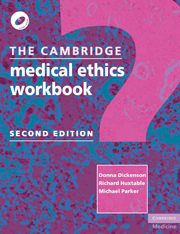Book contents
- Frontmatter
- Contents
- List of cases
- List of papers
- Preface to the second edition
- Preface to the first edition
- Cases in medical ethics and law: an interactive tutorial
- 1 Death and dying: decisions at the end of life
- 2 Reproduction: decisions at the start of life
- 3 Genetics: information, access and ownership
- 4 Medical research: participation and protection
- 5 Mental health: consent, competence and caring
- 6 Long-term care: autonomy, ageing and dependence
- 7 Children and young people: conflicting responsibilities
- 8 Resource allocation: justice, markets and rationing
- 9 Thinking about ethics: autonomy and patient choice
- Appendix 1 Study guide for teachers
- Appendix 2 Using keywords to explore this book
- Bibliography
- Index
Preface to the first edition
- Frontmatter
- Contents
- List of cases
- List of papers
- Preface to the second edition
- Preface to the first edition
- Cases in medical ethics and law: an interactive tutorial
- 1 Death and dying: decisions at the end of life
- 2 Reproduction: decisions at the start of life
- 3 Genetics: information, access and ownership
- 4 Medical research: participation and protection
- 5 Mental health: consent, competence and caring
- 6 Long-term care: autonomy, ageing and dependence
- 7 Children and young people: conflicting responsibilities
- 8 Resource allocation: justice, markets and rationing
- 9 Thinking about ethics: autonomy and patient choice
- Appendix 1 Study guide for teachers
- Appendix 2 Using keywords to explore this book
- Bibliography
- Index
Summary
The Cambridge Medical Ethics Workbook is a practical, case-based introduction to medical ethics for anyone who is interested in finding out more about and reflecting on the ethical issues raised by modern medicine. It is designed to be flexible; suitable both to be read in its own right and also for use as a set text in group teaching or in open learning. It is aimed at the interested general reader, at practising healthcare professionals and at medical and nursing students studying ethics for the first time.
The workbook is able to be flexible in this way because it is based around the reading of and reflection upon real cases. It uses a variety of structured activities to introduce and to explore the major ethical issues facing medicine today. These activities are clustered around: (a) cases (which were provided by healthcare professionals from many countries); (b) commentaries on those cases by healthcare professionals, ethicists, lawyers and so on; and (c) short papers by experts in the area concerned. This is very much a workbook, designed to help readers think about, reflect upon and to work their own way through ethical problems, by deliberating on the issues raised by them either alone or together with others. In this way, the reader is guided through the core themes in medical ethics in a way which is appropriate for them and which is relevant to their own experience.
- Type
- Chapter
- Information
- The Cambridge Medical Ethics Workbook , pp. xiii - xviPublisher: Cambridge University PressPrint publication year: 2010

